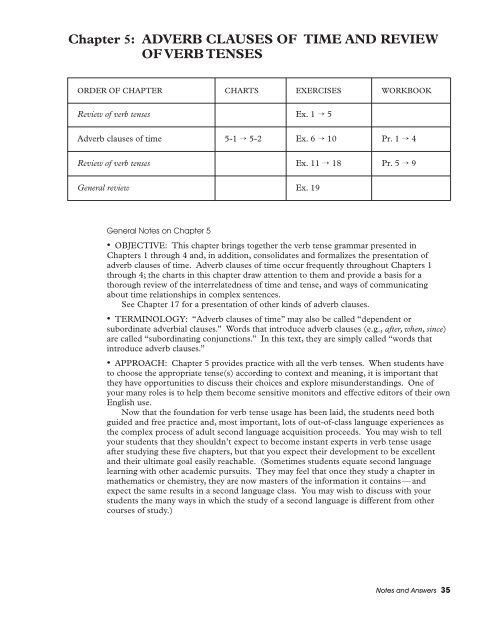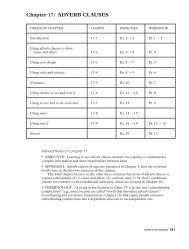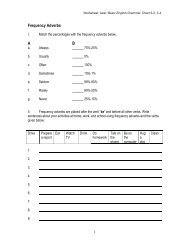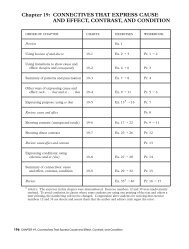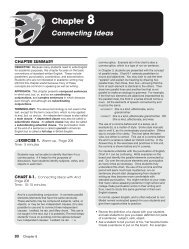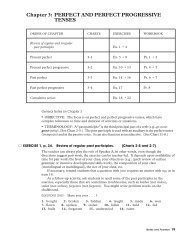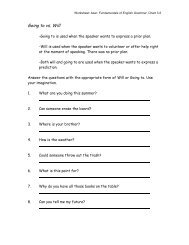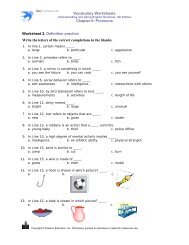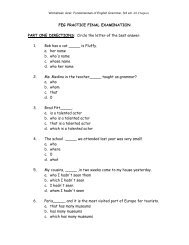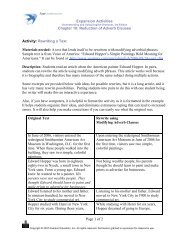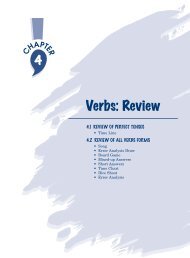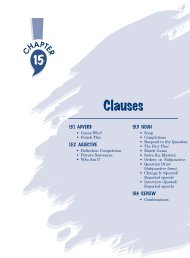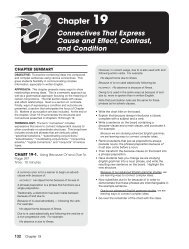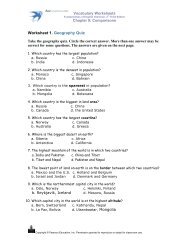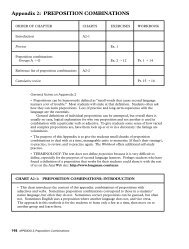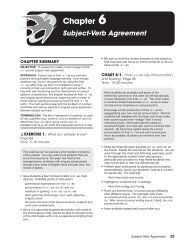Chapter 5: ADVERB CLAUSES OF TIME AND REVIEW OF VERB ...
Chapter 5: ADVERB CLAUSES OF TIME AND REVIEW OF VERB ...
Chapter 5: ADVERB CLAUSES OF TIME AND REVIEW OF VERB ...
Create successful ePaper yourself
Turn your PDF publications into a flip-book with our unique Google optimized e-Paper software.
<strong>Chapter</strong> 5: <strong>AD<strong>VERB</strong></strong> <strong>CLAUSES</strong> <strong>OF</strong> <strong>TIME</strong> <strong>AND</strong> <strong>REVIEW</strong><br />
<strong>OF</strong> <strong>VERB</strong> TENSES<br />
ORDER <strong>OF</strong> CHAPTER CHARTS EXERCISES WORKBOOK<br />
Review of verb tenses Ex. 1 → 5<br />
Adverb clauses of time 5-1 → 5-2 Ex. 6 → 10 Pr. 1 → 4<br />
Review of verb tenses Ex. 11 → 18 Pr. 5 → 9<br />
General review Ex. 19<br />
General Notes on <strong>Chapter</strong> 5<br />
• OBJECTIVE: This chapter brings together the verb tense grammar presented in<br />
<strong>Chapter</strong>s 1 through 4 and, in addition, consolidates and formalizes the presentation of<br />
adverb clauses of time. Adverb clauses of time occur frequently throughout <strong>Chapter</strong>s 1<br />
through 4; the charts in this chapter draw attention to them and provide a basis for a<br />
thorough review of the interrelatedness of time and tense, and ways of communicating<br />
about time relationships in complex sentences.<br />
See <strong>Chapter</strong> 17 for a presentation of other kinds of adverb clauses.<br />
• TERMINOLOGY: “Adverb clauses of time” may also be called “dependent or<br />
subordinate adverbial clauses.” Words that introduce adverb clauses (e.g., after, when, since)<br />
are called “subordinating conjunctions.” In this text, they are simply called “words that<br />
introduce adverb clauses.”<br />
• APPROACH: <strong>Chapter</strong> 5 provides practice with all the verb tenses. When students have<br />
to choose the appropriate tense(s) according to context and meaning, it is important that<br />
they have opportunities to discuss their choices and explore misunderstandings. One of<br />
your many roles is to help them become sensitive monitors and effective editors of their own<br />
English use.<br />
Now that the foundation for verb tense usage has been laid, the students need both<br />
guided and free practice and, most important, lots of out-of-class language experiences as<br />
the complex process of adult second language acquisition proceeds. You may wish to tell<br />
your students that they shouldn’t expect to become instant experts in verb tense usage<br />
after studying these five chapters, but that you expect their development to be excellent<br />
and their ultimate goal easily reachable. (Sometimes students equate second language<br />
learning with other academic pursuits. They may feel that once they study a chapter in<br />
mathematics or chemistry, they are now masters of the information it contains — and<br />
expect the same results in a second language class. You may wish to discuss with your<br />
students the many ways in which the study of a second language is different from other<br />
courses of study.)<br />
Notes and Answers 35
EXERCISE 1, p. 65. Error analysis: review of verb tenses. (<strong>Chapter</strong>s 1 → 4)<br />
The focus in this exercise is almost completely on verb tense usage. One miscellaneous<br />
error in singular–plural is also included, in item 7, for the alert student to catch.<br />
ANSWERS: 2. By the time I return to my country, I will have been away from home for<br />
more than three years. 3. As soon as I will graduate, I am going to return to my<br />
hometown. 4. By the end of the 21st century, scientists will have discovered the cure<br />
for the common cold. 5. I want to get married, but I haven’t met the right person<br />
yet. 6. I have seen that movie three times, and now I want to see it again. 7. Last<br />
night, I have had dinner with two friends. I have known both of them for a long time.<br />
8. I don’t like my job at the restaurant. My brother wants me to change it. I think he is<br />
right. 9. So far this week, the teachers have given us a lot of homework every day.<br />
10. There have been more than forty presidents of the United States since it became a<br />
country. George Washington was the first president. He became the president in<br />
1789. 11. While I am studying tonight, I’m going to listen to Beethoven’s Seventh<br />
Symphony. 12. We washed the dishes and cleaned up the kitchen after our dinner<br />
guests left/had left. 13. My neighbors are Mr. and Mrs. Jones. I have known them ever<br />
since I was a child. 14. It will rain tomorrow morning. / It is probably going to rain<br />
tomorrow morning. 15. Many scientists believe there will be / is going to be a major<br />
earthquake in California in the next few years. 16. When I got home to my apartment<br />
last night, I used my key to open the door as usual. But the door didn’t open. [The question<br />
of beginning a sentence with but may arise. In informal written English, sentences frequently begin<br />
with a coordinating conjunction. (See Chart 16-3.) Beginning a sentence with but is a question of<br />
style and register, not grammaticality.] I tried my key again and again with no luck. So I<br />
knocked on the door for my wife to let me in. Finally the door opened, but I didn’t see my<br />
wife on the other side. I saw a stranger. I had been trying to get into the wrong apartment!<br />
I quickly apologized and went to my own apartment.<br />
EXERCISE 2, p. 66. Review of verb tenses. (<strong>Chapter</strong>s 1 → 4)<br />
The important part of this lesson is for the learners to understand and attempt to explain<br />
the meaning of each sentence, noting the differences among similar sentences with different<br />
verb tenses. They may or may not name the verb tenses. They may or may not use the<br />
same sort of explanations used in this text and by the teacher. See the Introduction,<br />
p. xix, for information about discussion-of-meaning exercises.<br />
If you have a wall chart or transparency of Chart 1-5, this might be a good time to bring<br />
it out again.<br />
ANSWERS:<br />
1. (a) frequently, repeatedly, again and again. (b) at this moment, right now.<br />
2. (a) right now. (b) at this time on a past day. (c) at this time on a future day, or at a<br />
specific point of future time.<br />
3. (a) completed before now. (b) completed before another event or time in the past.<br />
(c) a plan to complete in the future before another event or time.<br />
4. (a), (b), and (c) have the same meaning. (d) means that the teacher’s arrival was a<br />
signal for the students to leave immediately. (e) means that the students had gotten up<br />
to leave shortly before the teacher arrived, but they had not yet left the room.<br />
36 CHAPTER 5, Adverb Clauses of Time and Review of Verb Tenses
5. (a) The waiting began two hours ago and is still in progress at present. (b) The waiting<br />
began two hours before another event or time in the past. (c) The waiting will have<br />
been in progress for two hours by the time another event occurs; the waiting may begin<br />
in the future or may have begun in the past.<br />
6. (a) not finished yet. (b) finished at an unspecified time before now. (c) at a specific<br />
time in the past ( ... last night, last weekend, etc.).<br />
7. (a) in progress recently, but not yet completed. (b) completed, but no date or time is<br />
specified.<br />
8. (a) and (b) are the same: You come, then I will begin to study. (c) and (d) are the<br />
same: Studying begins before you come and is in progress upon your arrival.<br />
(e) Studying will be completed before you come. (f) The studying will have been in<br />
progress for two hours by the time another event occurs; the studying may begin in the<br />
future or may have begun in the past.<br />
9. (a) completed activity. [He probably works in another place now.] (b) present activity that<br />
began two years ago.<br />
10. All four sentences mean the same. Although sentences (c) and (d) are both in the<br />
present tense, they describe an event that will happen in the future.<br />
EXERCISE 3, p. 67. Review of verb tenses. (<strong>Chapter</strong>s 1 → 4)<br />
If the exercise is teacher-led, approach each item conversationally; add extra words,<br />
rephrase the questions, put the questions in relevant contexts. These questions are in the<br />
text merely to suggest ideas as you engage the students in an oral review of verb tenses.<br />
In items where there are several related questions, ask a question and wait for the<br />
response, then follow that answer with the next question to the same student. Don’t stop<br />
for corrections or explanations until the item (the conversation) is completed.<br />
Short answers are natural in conversations. However, in this exercise students are<br />
practicing verb tenses, so they should answer in complete sentences. Students easily<br />
understand that this exercise is a sort of “grammar game,” especially an item such as 15.<br />
If the exercise is used for pair or group work, the students can simply monitor each<br />
other and check with you as necessary.<br />
POSSIBLE ANSWERS: 1. We’ve been studying verb tenses. We’ve studied the present perfect<br />
tense. We studied it two weeks ago. 2. We’ll have studied adjective clauses, gerunds,<br />
and many other grammatical structures. 3. Yes, I had. [BrE: Yes, I had done.] We<br />
studied some tenses last year. 4. We’ll have been studying it for about three weeks.<br />
5. I was practicing English. After that, I went to the next class. 6. I’m answering your<br />
question. I’ve been doing that for about 30 seconds. 7. I’m probably going to be sitting<br />
in this room again. 8. I’ll be sleeping. Last night at midnight I was sleeping.<br />
9. I’ll be living in my own home. I was living in another city. 10. I’ve been to the zoo.<br />
I went there last month. 11. I eat, study, and listen to the radio. 12. Since I came<br />
here, I’ve done a lot of grammar homework. 13. I’ve flown across the Pacific two<br />
times, climbed mountains, and written songs. I flew across the Pacific once last year,<br />
climbed Mt. Fuji in 1999, and wrote a song last month. 14. I’ve given some roses to my<br />
mother-in-law. 15. (review of all tenses)<br />
EXERCISE 4, p. 68. Review of verb tenses. (<strong>Chapter</strong>s 1 → 4)<br />
This exercise is a straightforward review of verb tenses, using uncomplicated sentences,<br />
contexts, and vocabulary. Students should be able to complete it on their own, or in pair or<br />
group work, with little difficulty.<br />
Notes and Answers 37
ANSWERS: 1. is studying [Check the spelling “yi.”] ...is also taking ...begin 2. had<br />
already eaten ...left ...always eats ...goes [Check for -s endings.] ...goes ...will<br />
eat/will have eaten 3. called ...was attending 4. will be attending 5. got ...<br />
was sleeping ...had been sleeping 6. is taking ...fell ...has been sleeping<br />
7. started ...hasn’t finished ...is reading 8. has read ...is reading ...has been<br />
reading ...intends ...has read ...has ever read 9. eats [no will in the time clause] ...<br />
is going to go ...will have eaten ...goes [no will in the time clause]<br />
EXERCISE 5, p. 69. Review of verb tenses. (<strong>Chapter</strong>s 1 → 4)<br />
Make sure the students understand the format.<br />
While the main point of this exercise is to practice verb tenses, the intention is that at<br />
least some of the exercise items develop into short natural dialogues between classmates.<br />
You may wish to walk around the room and listen to the exchanges—but don’t<br />
interrupt. Answer individual questions, but make longer explanations to the class only after<br />
the exercise is completed.<br />
A and B should exchange roles in Part II.<br />
CHART 5-1:<br />
<strong>AD<strong>VERB</strong></strong> <strong>CLAUSES</strong> <strong>OF</strong> <strong>TIME</strong>: FORM<br />
• Students were introduced to adverb clauses in Charts 2-9 and 2-10 in conjunction with the<br />
presentation of the simple past and past progressive. This chart is an expansion on a complex<br />
sentence structure that the students have been using throughout <strong>Chapter</strong>s 2, 3, and 4. It<br />
defines the term “adverb clause,” describes its form, and focuses on some of its features in<br />
written English, such as punctuation and sentence completeness. You might note for the<br />
students that the comma usually reflects a pause in speaking.<br />
• The use of a comma in a sentence begun by an adverb clause is less common in British<br />
English than American English. And even in American English, the comma may be omitted at<br />
times. The text focuses on usual usage as a way of providing a pattern that students can use as<br />
a guideline in their own production — without getting into too many refinements too soon,<br />
refinements that receptive students will later acquire as they gain experience with English.<br />
EXERCISE 6, p. 70. Adverb clauses of time. (Chart 5-1)<br />
ANSWERS: [The adverb clauses are underlined.]<br />
1. We went inside when it began to rain. 2. It began to rain. We went inside.<br />
3. When it began to rain, we went inside. 4. When the mail comes, my assistant opens<br />
it. 5. My assistant opens the mail when it comes. 6. The mail comes around ten<br />
o’clock every morning. My assistant opens it.<br />
EXERCISE 7, p. 71. Preview of Chart 5-2.<br />
This exercise provides a review of verb tenses while presenting adverb clauses. Students will<br />
probably have questions about both points. This exercise is another summary overview of<br />
the English tense system as presented in Chart 1-5. If you have it as a wall chart or a<br />
transparency, you might want to pull it out again.<br />
ERRATUM: Item 12 has as its intended completion the habitual past used to go.<br />
Presentation of the habitual past was deleted from the third edition of this book because it is<br />
covered thoroughly in Fundamentals of English Grammar (FEG = the black book). But this<br />
exercise item mistakenly was not changed in the revision. Instead of being deleted in a<br />
reprint, the item will remain here with the suggestion that you use this as an opportunity to<br />
review the habitual past. If students need more information, refer them to FEG by Azar.<br />
38 CHAPTER 5, Adverb Clauses of Time and Review of Verb Tenses
EXPECTED COMPLETIONS: 2. [after I did my homework.] 3. [after I do/have done my<br />
homework.] 4. [Ever since I was a child,] I have been afraid of dogs. 5. [while she<br />
was playing basketball] (a contact lens = a corrective piece of glass or plastic worn on the<br />
surface of the eyeball) 6. [before you hand it in to the teacher tomorrow.] 7. [By<br />
the time I left my apartment this morning,] the mail carrier had already delivered the<br />
mail. 8. [since he was ten years old] 9. [as I was driving my car to work this<br />
morning.] (Note: One superstition holds that a black cat crossing one’s path will bring bad luck.<br />
What other superstitions do the students know that will bring bad luck? Walking under a ladder?<br />
Breaking a mirror?) 10. [By the time I leave this city,] I will have been here for four<br />
months. 11. [Whenever Mark gets angry,] 12. I used to go to the beach [whenever<br />
the weather was nice,] but now I don’t have time to do that [because I have to<br />
study.] 13. [when my parents arrive from Moscow.] 14. [The next time I go to<br />
Hawaii,] 15. [the last time I ate at that restaurant]<br />
CHART 5-2:<br />
USING <strong>AD<strong>VERB</strong></strong> <strong>CLAUSES</strong> TO SHOW <strong>TIME</strong><br />
RELATIONSHPS<br />
• Point out the punctuation rule in Chart 5-1, then show how it works in the examples in<br />
Chart 5-2.<br />
• Also call attention to the first note in this chart: future verbs are NOT used in an adverb<br />
clause of time. (See Chart 4-2.) Discuss the other tenses in the examples; refer the students<br />
to <strong>Chapter</strong>s 1 through 4 as necessary.<br />
EXERCISE 8, p. 73.<br />
Using adverb clauses to show time relationships.<br />
(<strong>Chapter</strong>s 1 → 4; Charts 5-1 and 5-2)<br />
Notice that Exercise 8 looks like a regular multiple-choice exercise in which one chooses a<br />
single correct answer. It is not that kind of exercise. It is a combination exercise with<br />
multiple choices of connecting words. By contrast, Exercise 9 (which follows) is a<br />
traditional multiple-choice exercise.<br />
ANSWERS: 3. Whenever/Every time Susan feels nervous, she chews her nails.<br />
(before) 4. The frying pan caught on fire while I was making dinner. (by the time, as<br />
soon as) 5. Someone knocked on the door just as we were sitting down to eat. Just<br />
after we sat down to eat, someone knocked on the door. (just before) 6. As soon as the<br />
singer finished her song, the audience burst into applause. The audience burst into<br />
applause immediately after the singer finished her song. (as long as) 7. We have to wait<br />
here until Nancy comes. (as soon as, after) 8. After / As soon as / When Nancy comes,<br />
we can leave for the theater. 9. I knew that something was wrong just as soon as/when<br />
my roommate walked into the room yesterday. (whenever) 10. Just before I stood up to<br />
give my speech, I got butterflies in my stomach. (until, while) 11. The first time I saw<br />
the great pyramids of Egypt in the moonlight, I was speechless. (until, before) 12. Jane<br />
has gotten three promotions since she started working at this company six months ago.<br />
(before, when) 13. The phone rang shortly after / not long after / a short time after I<br />
had gone to bed. 14. When/Once the weather gets warmer, we can start playing tennis<br />
again. (while) 15. By the time Shakespeare died in 1616, he had written more than 37<br />
plays. (while, once) 16. The next time Sam goes to the movies, he’ll remember to take<br />
his glasses. (as long as, by the time) 17. As long as I live, I will not forget Mr.Tanaka.<br />
(as, so long as) 18. Mohammad had never heard about Halloween before/until he<br />
came to the U.S. (since)<br />
Notes and Answers 39
EXERCISE 9, p. 74. Verb tenses in adverb clauses of time. (Chart 5-2)<br />
EXERCISE 10, p. 75.<br />
This is a traditional multiple-choice exercise. If the students complete it as seat work, give<br />
them seven minutes. (Thirty seconds per item is standard for multiple-choice tests.)<br />
ANSWERS: 1. B 2. D 3. C 4. D 5. D 6. A 7. B 8. C<br />
9. B 10. B 11. B 12. A 13. D 14. B<br />
Using adverb clauses to show time relationships.<br />
(Chart 5-2)<br />
Encourage students to use a variety of verb tenses.<br />
See the Introduction, p. xvi, for suggestions on ways of handling open completion<br />
exercises.<br />
ANSWERS:<br />
[Answers depend on students’ creativity.]<br />
EXERCISE 11, p. 76. Review of verb tenses. (<strong>Chapter</strong>s 1 → 5)<br />
Students can perform some of these dialogues dramatically, with appropriate gestures and<br />
emotional voices. This can be great fun. You might want to assign the dialogues to be<br />
memorized by pairs of students and then presented to the class without their looking at<br />
their books. It should take them only a few minutes to memorize their dialogue.<br />
ANSWERS: 1. am listening 2. A: Have you met B: have never had 3. A: are you<br />
doing B: am trying A: will electrocute / are going to eletrocute 4. A: is lying<br />
B: see . . . certainly looks 5. A: went B: Was it A: enjoyed B: did you see<br />
A: had never seen B: have seen . . . saw . . . was . . . wasn’t 6. A: had never<br />
been B: were you doing A: were driving 7. A: Are you taking B: am not<br />
A: Have you ever taken B: have A: did you take . . . was . . . is/was he B: is/was<br />
8. A: was . . . haven’t received . . . don’t have/haven’t B: do you need A: will pay<br />
... get 9. A: isn’t B: will be sitting 10. A: do you know . . . have been<br />
looking B: is seeing . . . received A: sounds . . . has . . . will be working<br />
EXERCISE 12, p. 78. Review of verb tenses. (<strong>Chapter</strong>s 1 → 5)<br />
Students in pairs can work out the answers. Then one pair can read the whole exercise<br />
aloud to the class. Other students should note any errors, but should not interrupt the<br />
dialogue. At the end, discussion can always clear up the mistakes.<br />
ANSWERS: (1) Are you studying (2) am (3) have been ...studied / was studying /<br />
had been studying (4) are you taking (5) am taking ...are you taking (6) am<br />
studying ...need ...take (7) have you been (8) have been ...arrived ...have<br />
been studying ...lived / was living (9) speak ...Did you study / Had you studied<br />
...came (10) studied / had studied / had been studying ...spent ...picked ...was<br />
living/lived (11) were ...came ...had never studied ...started (12) do you<br />
plan / are you planning (13) I’m not ...return ...will have been (14) hope / am<br />
hoping<br />
EXERCISE 13, p. 79. Review of verb tenses. (<strong>Chapter</strong>s 1 → 5)<br />
Students in pairs or individually can work out the answers. As a variation, you could ask the<br />
students to write the letter (without the numbers in parentheses). When they finish, they<br />
can exchange letters and look for each other’s mistakes. (Copying from a text is usually<br />
more beneficial for lower- or mid-level students than for advanced students, who make few<br />
mistakes and generally find it busywork.)<br />
This exercise is intended as a model for the student writing assignment that follows in<br />
Exercise 14.<br />
40 CHAPTER 5, Adverb Clauses of Time and Review of Verb Tenses
ANSWERS: (1) received (2) have been trying . . . have been (3) have had<br />
(4) has been staying (5) and (6) have spent / have been spending (7) have<br />
been (8) went . . . watched (9) have barely had (10) is . . . am sitting<br />
(11) have been sitting (12) leaves . . . decided (13) am writing (14) am<br />
getting (15) will take / am going to take . . . get (16) are you getting (17) are<br />
your classes going<br />
EXERCISE 14, p. 79. Writing. (<strong>Chapter</strong>s 1 → 5)<br />
You may wish to require the students to use each of the 12 tense forms at least once. That<br />
sometimes results in forced sentences, but the students usually find it challenging and fun.<br />
Refer the students once again to Chart 1-5 so they can see which verb forms they need to<br />
try to include.<br />
EXERCISE 15, p. 80. Review of verb tenses. (<strong>Chapter</strong>s 1 → 5)<br />
ANSWERS: (1) has experienced (2) will experience / is going to experience<br />
(3) began (4) have occurred (5) causes (6) have developed (7) waves<br />
(8) hold (9) moves (10) know (11) happened (12) struck (13) were<br />
sitting (14) suddenly found (15) died . . . collapsed (16) sent (17) will<br />
the next earthquake occur / is the next earthquake going to occur (18) have often<br />
helped (19) are studying (20) and (21) also appear (22) seem (23) have<br />
developed (24) will be (25) strikes<br />
EXERCISE 16, p. 81. Activity: review of verb tenses. (<strong>Chapter</strong>s 1 → 5)<br />
When you make this assignment, announce a time limit (perhaps five minutes) so that the<br />
stories are not long. This is not a dictation exercise, so Student A should listen to Student<br />
B’s complete story, then report it in a written paragraph. Both students should tell their<br />
stories to each other first; then they can both write at the same time.<br />
EXERCISE 17, p. 81. Activity: review of verb tenses. (<strong>Chapter</strong>s 1 → 5)<br />
Only a few students each day should speak. Thus, the exercise can continue over several<br />
days. Students who are not speaking should be instructed to take notes in order to practice<br />
listening skills. They can also note (1) questions to ask for additional information and<br />
(2) problems with verb tenses or pronunciation. These notes can be used for discussion<br />
after the speaker is finished.<br />
Remind students of the time limit. During the reports, you may wish to appoint one<br />
student as a timekeeper.<br />
As preparation for this exercise, you may wish to bring a newspaper article to class and<br />
have the class work together in making a two- or three-minute summary so that the<br />
students will understand exactly what you expect. The article may also be used for a<br />
discussion of verb forms; you can discuss the verb forms that the students have already<br />
studied and point out the forms that they are going to study later (e.g., modals, sequence of<br />
tenses in noun clauses, gerunds and infinitives, passives).<br />
EXERCISE 18, p. 81. Activity: review of verb tenses. (<strong>Chapter</strong>s 1 → 5)<br />
The purpose of this exercise is to promote a wide range of tense usage in meaningful<br />
communication.<br />
Use item 1 to get the students thinking about things they should consider. For<br />
example: What means of transportation were available to prehistoric human beings? How<br />
did the invention of the wheel change things? What kinds of animals have been used for<br />
transportation? What are modern means of transportation? How has the invention of these<br />
modern means of transportation changed human life? Etc.<br />
Notes and Answers 41
SUGGESTION: Assign one group of students one topic and ask them to make a list of<br />
discussion questions. The list of questions can be handed to one other group, or passed<br />
around to all the groups — depending on how much time you decide to devote to this<br />
discussion exercise.<br />
ALSO POSSIBLE: Make up a few discussion questions yourself for each item to expedite<br />
the process of getting the students thinking about the discussion topics.<br />
The written summary can be quite short. Ask the students simply to list the main points<br />
of their discussion. The assignment is not intended to be developed into a formal<br />
composition with an introduction, body, and conclusion—but you could, of course, choose to<br />
do so if the organization and presentation of ideas in written English is a focus in your class.<br />
EXERCISE 19, p. 81. Error analysis: general review. (<strong>Chapter</strong>s 1 → 5)<br />
Not all of the mistakes are verb tenses; some involve capital letters, singular–plural<br />
agreement, and pronoun usage. All of the mistakes are typical of many learners at this level<br />
of proficiency and are the kinds of errors they should look out for in their own writing. As<br />
always, the items are directly adapted from student writing.<br />
ANSWERS:<br />
1. I have been living at 3371 Grand Avenue since last September.<br />
2. I have been in NewYork City for two weeks ago. OR I was in NewYork City two<br />
weeks ago.<br />
3. My country has changed its capital city five times.<br />
4. Dormitory life is not quiet. Everyone shouts and makes a lot of noise in the halls.<br />
5. My friends will meet me when I will arrive at the airport.<br />
6. Hasn’t anyone ever told you to knock on the door before you enter someone else’s<br />
room? Didn’t your parents teach you that?<br />
7. When I was a child, I viewed things from a much lower height. Many physical objects<br />
around me appeared very large. When I wanted to move something such as a chair, I<br />
needed help.<br />
8. I will intend to go back home when I finish my education.<br />
9. The phone rang while I was doing the dishes. I dried my hands and answered it. When<br />
I heard my husband’s voice, I was very happy.<br />
10. I have been in the United States for the last four months. During this time, I have done<br />
many things and (have) seen many places.<br />
11. When the old man started to walk back to his cave, the sun had already hidden itself<br />
behind the mountain.<br />
12. While I was writing my composition last night, someone knocked on the door.<br />
13. I’m studying English at an English conversation school two times a week.<br />
14. Getting accustomed to a different culture is not easy.<br />
15. I’m really glad you visited / are going to visit / will visit / will be visiting my hometown<br />
this year.<br />
16. While I was visiting my cousin in Los Angeles, we went to a Thai restaurant and ate<br />
Thai food.<br />
17. After we ate dinner, we watched TV. OR We ate dinner. We watched TV afterwards.<br />
18. When I was in my country, I was afraid to come to the United States. I thought I<br />
couldn’t walk outside at night because of the terrible crime. But now I have a different<br />
opinion. I have lived in this small town for three months and (have) learned that there<br />
is very little crime here.<br />
19. Before I came to the United States, I pictured the U.S. as an exciting place with honest,<br />
hard-working, well-mannered people. Since I came to the United States four months<br />
ago, this picture has changed. The manners of the students while [also possible: when]<br />
they are in the cafeteria are really bad. I also think that office workers here are lazy.<br />
People in my country work a lot harder.<br />
42 CHAPTER 5, Adverb Clauses of Time and Review of Verb Tenses


